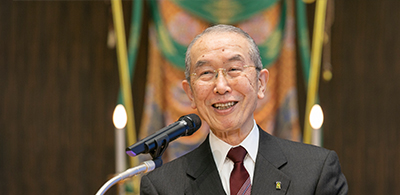Creating Happiness for Yourself and Others
March 2019

Because We Are Children of the Buddha
All of us, no matter who we are, want ourselves and our families to be happy. At the same time, our inherent buddha-nature means that we possess minds that want other people—even strangers—to be happy as well.
To quote from chapter 3 of the Sutra of Innumerable Meanings (“Ten Merits”), “All of you good sons and good daughters are now truly children of the Buddha who, with great benevolence and great compassion, remove suffering and prevent calamities.” In other words, as children of the Buddha, we are able to relieve people’s sufferings, free them from calamities, and put their feelings at ease when we focus on compassion.
Whether or not we have realized that we are children of the Buddha seems like it would be important, but in reality, very few of us have interacted with others while keeping this realization in mind.
However, I think that someone who understands, for instance, that our lives are impermanent and devoid of self is a child of the Buddha. Whether you learned about the Three Seals of the Dharma (all things are impermanent, all things are devoid of self, and nirvana is tranquil) on your own or someone told you about them, the fact that they strike a chord of truth deep within you and you say to yourself, “That’s really true,” is because you are a child of the Buddha.
To quote from the Flower Garland Sutra, “The time of the first aspiration is, namely, the attainment of perfect awakening.” This line of scripture tells us that as soon as someone has entered the gateway of the Buddha’s teaching, that person has already grasped part of the Buddha’s enlightenment. Therefore, if this person gains even a little awareness of “all things never stop changing” or “since everything is a manifestation of the buddha-nature, everything in this world is in a state of great harmony,” this is none other than a realization that he or she is a child of the Buddha. Such persons can be called bodhisattvas, as they want happiness for themselves and others and they bring happiness to their surroundings.
Becoming a Living Sutra
In Rissho Kosei-kai, we say that everyone who joins our organization is a disseminator of the teaching. In general, it is normal to think that a beginner who has only just come in contact with the teaching of the Buddha is not capable of doing something like disseminating the Dharma to others. However, a passage in “Ten Merits” clearly tells us that those who hear the Buddha’s teaching can emancipate others from suffering even if they are still unable to free themselves from delusions.
For example, a man harboring fierce anger toward a friend might hear the Buddha’s teaching and reflect on it, thinking, “My anger was caused by the self-centered mind that wanted my friend to act according to my wishes.” The man can then use this self-reflection to regain a harmonious relationship with his friend. He can also serve as an example to other people around him, who may think, “I wish I could master seeing things that way and accept them as he did. I want to feel relief and be happy.” This man, who is still quite inexperienced, can serve as an example because the Buddha’s teachings that guide him are in accord with Truth.
Everyone has the desire to get along harmoniously with others. Therefore, merely speaking honestly about what you have realized through hearing the Buddha’s teachings and how they have inspired you gives others hope that they can become a person like you, living each day with a mind that is bright, truthful, and compassionate. They will want to be like you—to draw close to others who have worries and troubles and experience with them the joy of becoming happy.
It is also written in “Ten Merits” that “this sutra abides wherever bodhisattvas are practicing.” I hope that living brightly and cheerfully shines the light of Truth into the hearts of people sunk in despair, and that we are guiding them toward a life of tranquility by serving as “good fields of blessings” for all living beings. In other words, I hope we will all become people who produce happiness.
In order to do so, at all times and for all people, we should never forget the attitude of “cheerfully, kindly, and warmheartedly.” You may not be skillful at explaining scripture, but as long as you remain steadfast in being considerate of others, you can become a “living sutra” who brings happiness to yourself and other people.
Back Number



